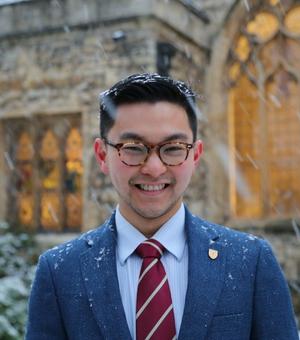Vance Z H Tan GMICE is a Sultan's Scholar at Oxford University and an engineer by training. Vance's research focuses on understanding how national governments could rethink long-term investment strategies in flood risk management set against a backdrop of budget-constrained resources. Vance is interested in understanding how future flood risks can be managed by considering policy changes and the anticipatory actions of adaptation measures at a national scale.
Vance on dyslexia and dyspraxia, including an extract from a conversation in 2018: Hi, I'm Vance. I came to England as a boarder at Abingdon School, just south of Oxford. That was from 2010-12, which means I must've been in England for about ten years now. From there, I pursued an undergraduate Master's degree in Civil Engineering at Warwick University, which is in Coventry. I'm currently researching new ways of reframing the flood risk investment strategies for England in collaboration with the Environment Agency and a few industrial stakeholders.
Looking back to my primary school years, I can remember a pattern of getting similar words or numbers mixed up, which was put down to carelessness. But, to be honest, I wasn't aware of my dyslexia until a couple of my tutors at Warwick suggested that I might go and get it assessed. My tutors noticed that I tend to be slower at digesting course materials that involved extensive reading than others in my cohort. And as the course went on, I noticed that I was just getting overwhelmed by: (i) the amount of text I had to digest, (ii) the amount of writing I had to do at university exams, and (iii) my general inability to grasp concepts that may look straightforward to others.
Eventually, when the dyslexia assessment report came through, we found out that not only was I dyslexic, but I was also dyspraxic. I think this is accurate considering my past experiences with sport and life more generally.
[...] I remember the days before Oxford when I would almost certainly avoid playing sports that involved hand-eye coordination because I couldn't hack it. However, that changed once I came to Teddy Hall. I was determined to give rugby a go to improve my non-existent coordination. Of course, I still can't catch the ball well but at least 'playing rugby' has been ticked off my bucket list.
I do think that getting my dyslexia/dyspraxia assessed was an important milestone for me. Recognising that I need support means that I can implement strategies to help me cope with life. For instance, I have a pair of yellow-tinted glasses that I use for reading. I have also been taught specific strategies by my DAS tutor to overcome difficulties organising my thoughts. They've also helped me put my artistic mind to good use.
So do you draw in your spare time?
Well, yes, but not in the traditional sense. I produce quite a bit of scientific drawings and sketches regularly as part of my D.Phil work and jot down my thoughts. Most of these sketches make perfect sense to me, but it usually takes some help from friends to translate them into something that everyone else could understand. It's not always bad news, though, as I think some of my sketches ended up to be relatively novel.
How did you get into Engineering?
Through a combination of coincidence and perseverance, I'd say. I have always been more interested in media studies, but I settled for Engineering because of the funding opportunities that were available to me at the time.
Do you know anybody else that is dyslexic?
No, but what I do know is that dyslexia isn't talked about enough. A few friends at Warwick are aware of my dyslexia, and I've also told a couple of friends at Oxford. I'm happy for people to know about my dyslexia, and I think more awareness would help break down those conversation barriers.



